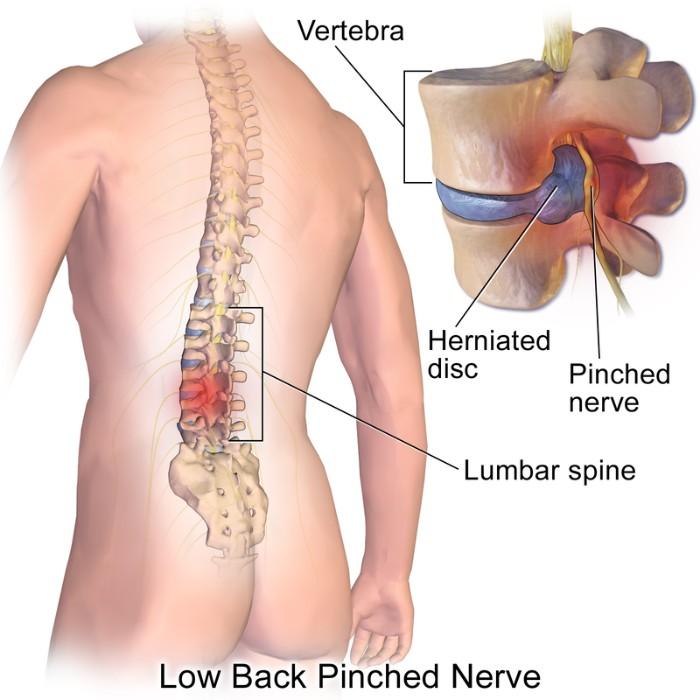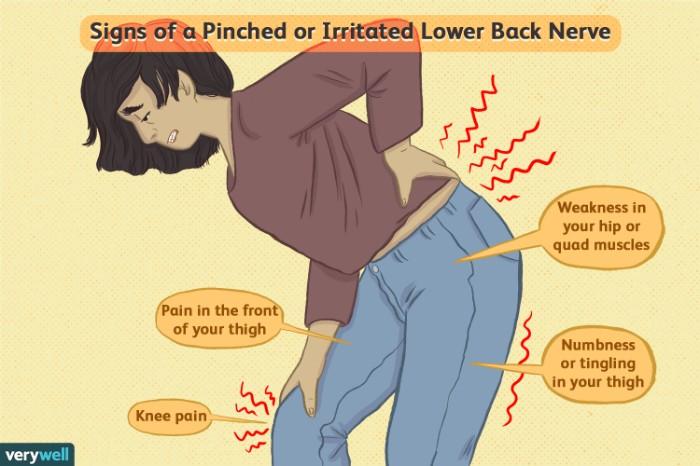Are you among the millions suffering from a pinched nerve in their lower back? You know, that sensation of shooting pain up your spine or radiating out to other parts of your body.
That numbing and tingling sensation down the side of your leg or arm when you move the wrong way and feel like someone is squeezing your nerves with a clamp? Pinched nerves can be incredibly painful and even immobilizing, but don't despair. Help is possible.
In this blog post, we'll take an in-depth look at symptoms, causes, treatments, and more so you can understand how to relieve this common (but no less debilitating) condition.
What is a Pinched Nerve in the Lower Back and its Causes
A Pinched Nerve in the lower back is a common medical condition. It occurs when a nerve root in your spine becomes compressed, resulting in pain, numbness, and tingling sensations. Varvariousitions, such as herniated discs, spinal stenosis, or bone spurs, can cause pinched nerves. Other potential causes include injury, poor posture, obesity, muscle strain, and overuse of muscles.
While Pinched Nerves in the lower back can be painful and uncomfortable, they are usually treatable with rest and physical therapy. In some cases, medical intervention may be necessary to relieve the symptoms. If left untreated, Pinched Nerves in the lower back can result in long-term disability or paralysis.
Signs and Symptoms of Pinched Nerve in Lower Back
The most common symptom of a Pinched Nerve in the lower back is pain that radiates from the area around the pinched nerve down to the legs. Other symptoms may include numbness, tingling, burning sensations, and weakness in the affected area. Pinched nerves can also cause muscle spasms or cramps in the legs.
Treating Pinched Nerves in Lower Back

Treatment for Pinched Nerves in the lower back may include rest, physical
therapy, and anti-inflammatory medications. If these treatments are unsuccessful, surgery may be necessary to decompress the pinched nerve. Pinched Nerve relief can also be achieved through chiropractic care, acupuncture, and massage therapy.
If you are experiencing Pinched Nerve-related pain in your lower back, it is important to seek medical attention immediately. The sooner a Pinched Nerve is diagnosed and treated, the less likely it is to cause long-term disability or paralysis. Pinched Nerves in the lower back can be painful and uncomfortable, but with proper treatment, they can be managed effectively.
Diagnosing a Pinched Nerve in the Lower Back
Pinched Nerves in the lower back are usually diagnosed through a physical examination and medical imaging tests such as X-rays, magnetic resonance imaging (MRI), or computed tomography (CT) scans. During the diagnostic process, your doctor will look for signs of nerve compression by examining your posture and range of motion.
In addition to medical imaging, your doctor may also use nerve conduction studies and electromyography (EMG) to diagnose Pinched Nerves in the lower back. These tests measure how well electrical signals travel through the nerves in your body and can help pinpoint which nerves are affected.
Once a Pinched Nerve has been diagnosed, it is important to begin treatment immediately. Pinched Nerves in the lower back can worsen if left untreated, so it is important to seek professional help immediately.
At-Home Remedies for a Pinched Nerve in the Lower Back
At-home remedies can help provide Pinched Nerve relief and promote healing. These include:
- Resting and avoiding activities that trigger pain
- Applying ice or heat to the affected area
- Taking over-the-counter medications such as ibuprofen or acetaminophen for pain relief
- Doing gentle stretching and light exercises to maintain mobility
- Using an orthopedic brace or cushion to provide support
- Practicing good posture when sitting, standing, and sleeping
If Pinched Nerve symptoms persist for over a few weeks, it is important to seek medical attention. Pinched Nerves in the lower back can worsen if left untreated, so it is important to get help right away.
By following these simple steps and seeking professional help when needed, Pinched Nerves in the lower back can be managed effectively. Pinched Nerves are a common condition that can cause significant discomfort, but with proper treatment, they can usually be managed without long-term disability or paralysis. If you are experiencing Pinched Nerve symptoms, contact your doctor for further advice and treatment.
When to See a Doctor for your Pinched Nerve in the Lower Back

If you are experiencing Pinched Nerve symptoms in your lower back, it is important to seek medical attention immediately. Pinched Nerves can worsen if left untreated and cause long-term disability or paralysis. In addition to pain, Pinched Nerves can cause numbness, tingling, burning sensations, and weakness in the affected area.
It is also important to see a doctor if Pinched Nerve symptoms persist for over a few weeks, as this may indicate that additional treatments are necessary. Pinched Nerves in the lower back can be treated with rest, physical therapy, and anti-inflammatory medications. If these treatments are unsuccessful, surgery may be recommended to reduce pressure on the Pinched Nerve.
Pinched Nerves in the lower back can be painful and uncomfortable, but with proper treatment, they can usually be managed without long-term disability or paralysis. If you are experiencing Pinched Nerve symptoms, contact your doctor for further advice and treatment. With prompt diagnosis and treatment, Pinched Nerves in the lower back can be managed effectively.
FAQs
How do they fix a pinched nerve in your lower back?
A Pinched Nerve in the lower back can usually be treated with rest, physical therapy, and anti-inflammatory medications. Surgery is sometimes necessary to reduce pressure on the Pinched Nerve.
What are the symptoms of a pinched nerve in your lower back?
The symptoms of Pinched Nerves in the lower back can include pain, numbness, tingling, burning sensations, and weakness in the affected area.
How long does it take to recover from a pinched nerve in your lower back?
The length of recovery time will depend on the severity of the Pinched Nerve and the treatment method used. Pinched Nerves in the lower back can usually be managed with rest, physical therapy, and anti-inflammatory medications within a few weeks.
Conclusion
In conclusion, a pinched nerve in the lower back can be a serious and often recurring issue. This blog has offered information on understanding the condition’s symptoms and causes and treatments that may be available to you.
However, the best way to find relief is to consult with a physician or physical therapist to ensure that any intervention you undertake is right for your particular situation.




